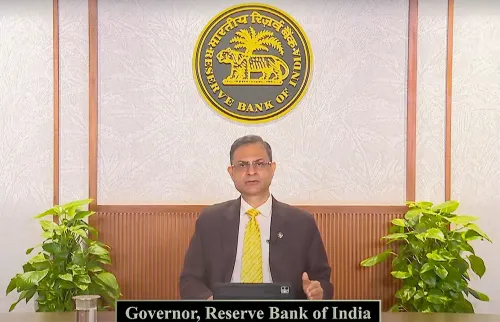How is RBI Easing Norms for Small Business Loans?

Synopsis
Key Takeaways
- RBI's new guidelines enhance lending flexibility.
- Working capital loans now available to gold-reliant businesses.
- Option for borrowers to switch to fixed-rate loans.
- Feedback on guidelines accepted until October 20.
- Weekly credit data submissions proposed for better tracking.
New Delhi, Sep 30 (NationPress) The Reserve Bank of India (RBI) has announced updated regulations for small business loans, enhancing the lending flexibility for banks in relation to the extra interest or spread applied throughout the loan duration.
Additionally, the RBI has relaxed lending conditions for businesses reliant on gold as a fundamental material.
"Traditionally, banks are restricted from providing loans for acquiring gold or silver in any form, or lending against the collateral of primary gold or silver. Nonetheless, a special exception has been made for Scheduled Commercial Banks (SCBs) to offer working capital loans to jewellers," stated the announcement.
Previously, banks had the ability to adjust the spread associated with a borrower's credit risk only once every three years for business loans.
Now, with the new regulation, banks can lower other spread components before the three-year timeline, thereby aiding borrowers. Moreover, borrowers are granted the option to transition to a fixed-rate loan during the reset period.
The updated guidelines permit banks to issue working capital loans to any enterprise utilizing gold as a raw material, thereby broadening credit access beyond the jewellery industry, which had faced strict limitations concerning financing gold and silver acquisitions.
The RBI has put forth seven directives for lenders, comprising three compulsory and four subject to public consultation. They have welcomed feedback on these initiatives until October 20.
The central bank has also broadened the lending capabilities of smaller urban cooperatives, enhancing credit availability. Additionally, capital regulations have been relaxed, enabling banks to utilize foreign currency and overseas-rupee bonds as Additional Tier 1 capital, facilitating access to international markets.
The RBI's directive necessitated the submission of credit data by Credit Institutions (CIs) to Credit Information Companies (CICs) at intervals of two weeks or less.
The RBI has proposed a shift to weekly credit data submissions by CIs to CICs.
The draft amendments also stipulate measures to enable quicker data submissions and error corrections by the CIs, as indicated in the release.
Furthermore, to streamline the aggregation of credit data by CICs, it is proposed to include the Central Know Your Customer (CKYC) number in a distinct field within the reporting format for the consumer segment, as noted in the release.









